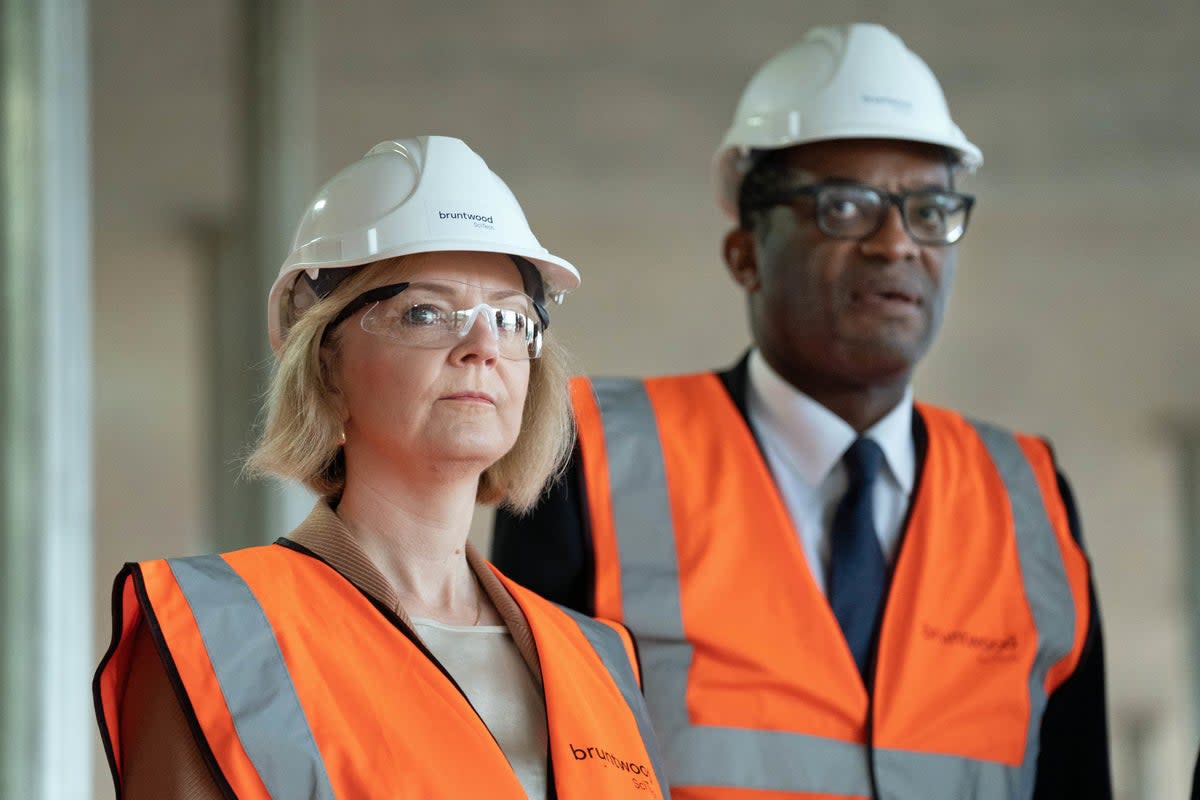Voices: I tried to understand why Kwarteng and Truss made their historic error – but I failed

- Oops!Something went wrong.Please try again later.
- Oops!Something went wrong.Please try again later.
Yesterday I literally sat at the feet of the chancellor in an attempt to understand this government’s economic policy. Journalists were allowed to sit in the front row for a fringe meeting at the Conservative Party conference, and so I found myself a few feet away from Kwasi Kwarteng, looking up at him, as he sat in an armchair on a low stage.
I was in a good position to learn how it is that this growth plan is going to work. Or, at least, why the small but highly motivated group of clever people who have captured the party of government think it might work. I have to report, however, that my mission was a failure. Perhaps I am just an irredeemable member of the “anti-growth coalition” identified in the prime minister’s speech today, but it doesn’t make sense to me on its own terms.
Kwarteng began the session, as an economic historian should, with a recap of the previous episode of the Rolling Fiscal Disaster box set. He said that the government was right to spend vast sums of money to support people during coronavirus lockdowns, but that it was wrong to raise taxes to pay for it.
This sounded like an echo of Liz Truss’s claim during the Conservative leadership campaign that Covid debt should be treated like war debt – that is, and I hope I am not paraphrasing unfairly, it should be put into a box marked “not to be repaid for many decades” and forgotten about.
The problem is that I cannot find anyone who knows about public sector debt who thinks that you can separate “Covid debt” from other government borrowing and treat it differently and more favourably. It is all debt. It all has to be paid for. The question facing Rishi Sunak as chancellor last year was whether, when coronavirus restrictions were lifted, the government should carry on borrowing a lot to cover the gap between revenue and running costs, or whether it should try to reduce borrowing, either by cutting spending or raising taxes.
He chose to put up taxes, and made such a strong enough case that Boris Johnson was forced to agree with him. Even Johnson agreed that higher taxes were the least of three evils, the other two being borrowing or spending cuts.
Truss and Kwarteng disagreed. They don’t want spending cuts. Truss wants a big increase in defence spending, and when she was foreign secretary she didn’t argue to cut her own foreign aid budget, although it is the least popular heading of spending with the general public – and indeed with Conservative Party members.
They thought the Covid spending should all go on the tab. “In our intervention, we had to think about how to grow our economy,” Kwarteng explained at the Institute for Economic Affairs fringe meeting. He and Truss think tax rises are bad for growth; they don’t want to mention spending cuts; so they managed to convince themselves, despite calling themselves Thatcherites, that more borrowing was the least of the three evils.
I didn’t agree with them, and I tried to point out that Margaret Thatcher would have been horrified: she put up VAT, stabilised the public finances and only then cut income tax. But I could see that people could take different views about whether more debt or higher taxes would be more of a drag on the economy, especially if you thought we were still in the era of ultra-low interest rates.
Then came the energy crisis. In a way, it strengthened the case against tax rises, because we were now back into emergency mode, where the government had a responsibility to stave off recession and save jobs. Sunak half accepted that by half reversing the national insurance increase.
To keep up to speed with all the latest opinions and comment, sign up to our free weekly Voices Dispatches newsletter by clicking here
But then the gas price went so high that the only politically viable option was for the government to subsidise prices – at a huge cost, comparable to that of coronavirus support. Kwarteng was asked yesterday why the government didn’t limit that support so that people using more than a certain amount of gas and electricity to heat their mansions and swimming pools would pay the market price. To which he said: “We had to act at speed and the best approach is universal.”
Not only that, but he decided to intervene to fix energy prices for businesses and institutions too. This was a further huge intervention, and enough to see off the threat of recession. By then, though, he and Truss were trapped by her promises of tax cuts in the Tory leadership campaign. And they could see that interest rates were starting to rise, making more borrowing less attractive.
At this point, they could have turned left and slammed on the brakes, or right and cut taxes by even more. They turned right, and it was a disastrous mistake.
I think the explanation is that they were stuck in a way of thinking that was defensible before the energy bailout and before interest rates went up, which was reinforced by the simplicity of a “tax cuts” message in the closed world of the Tory leadership campaign. And if I can’t understand how they think it will work now, I am in good company, because I think the reason the markets reacted so badly is that they can’t understand it either.

